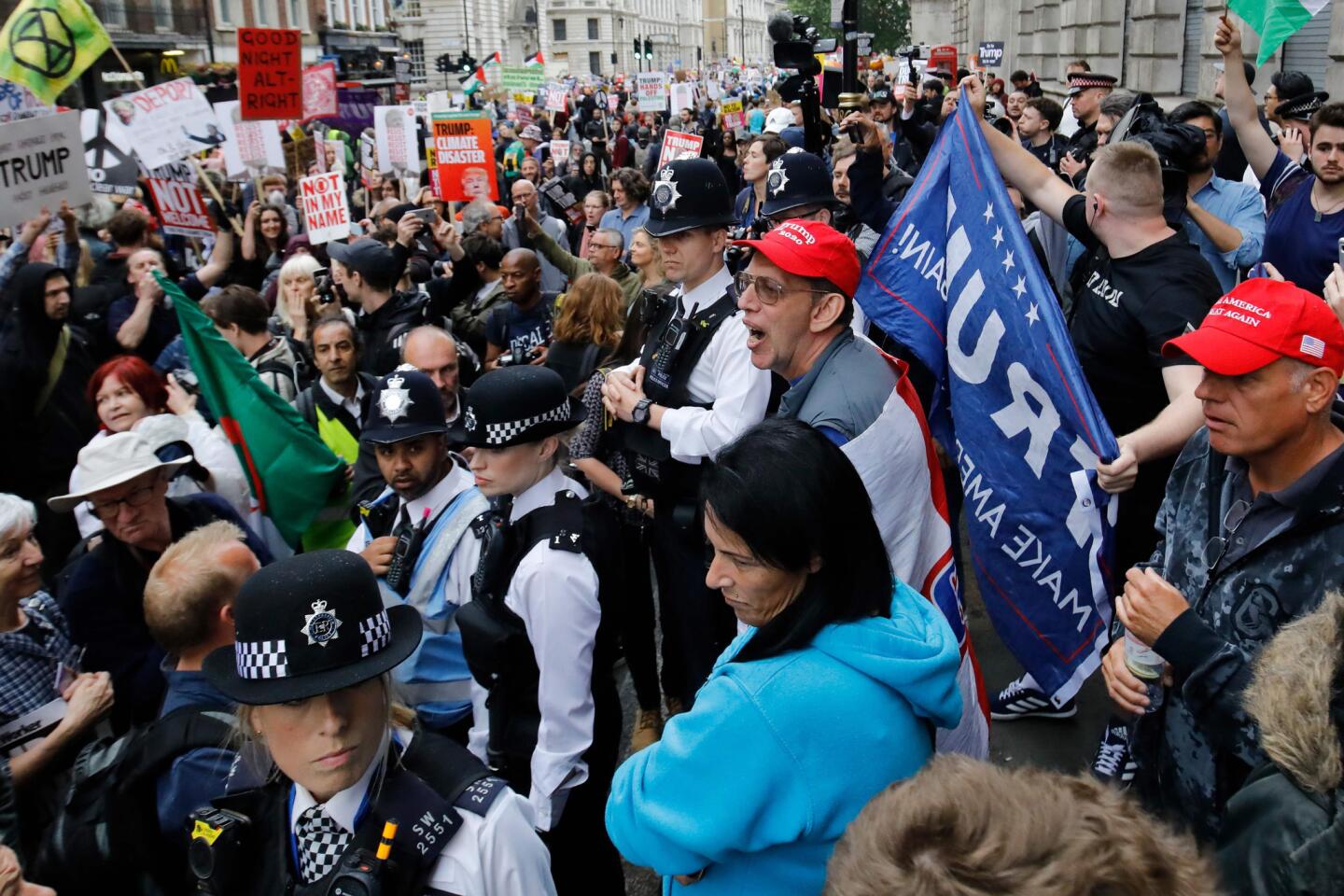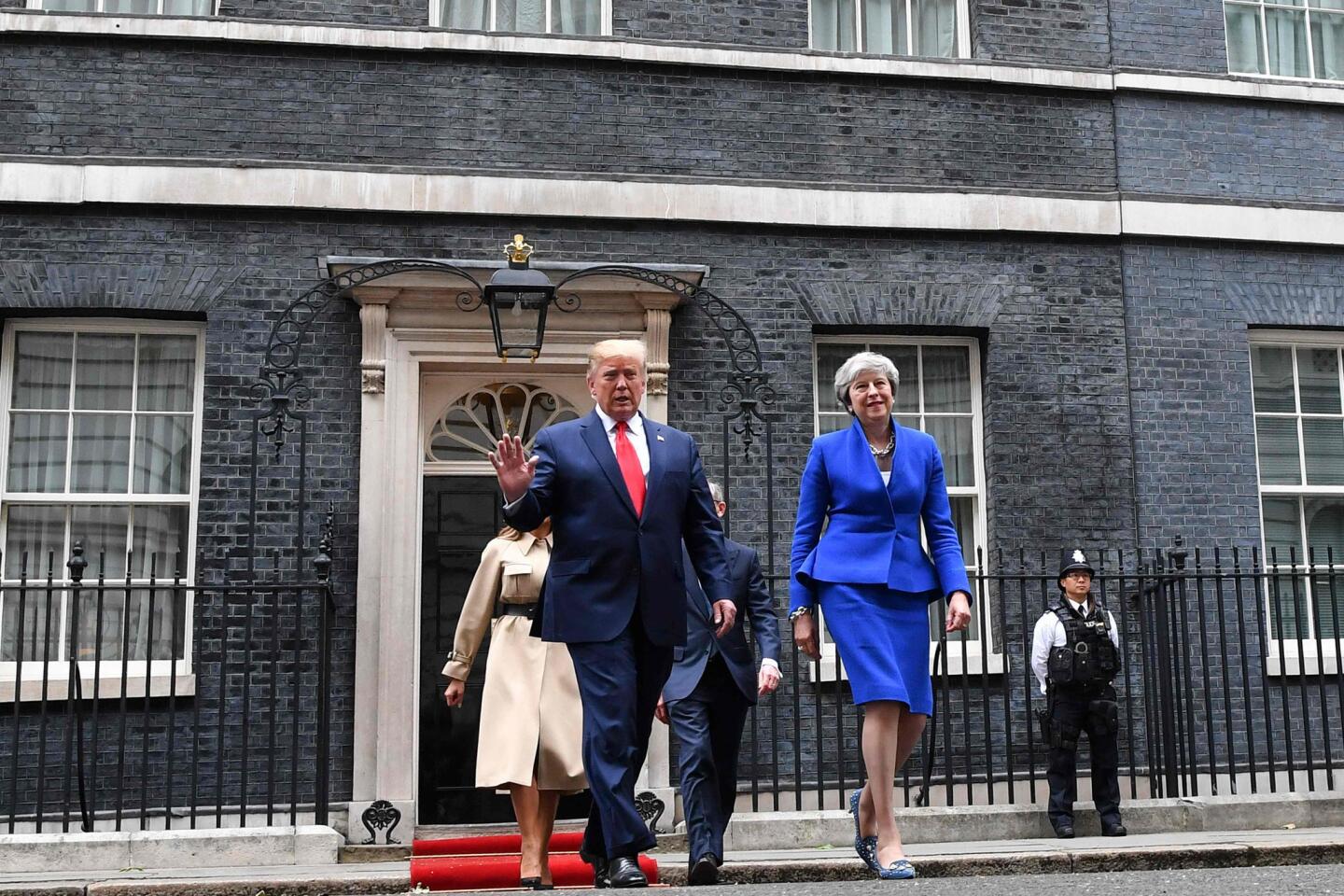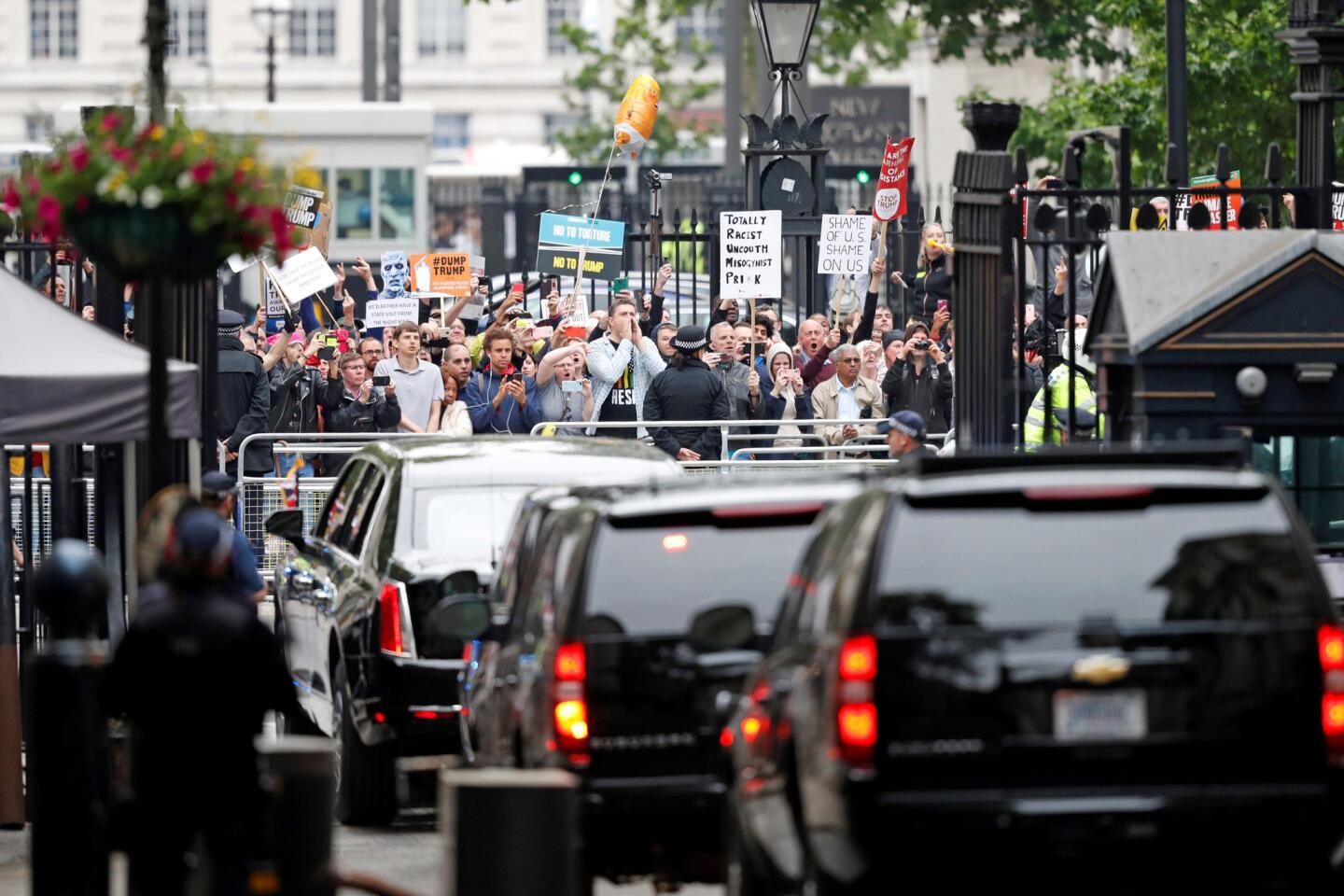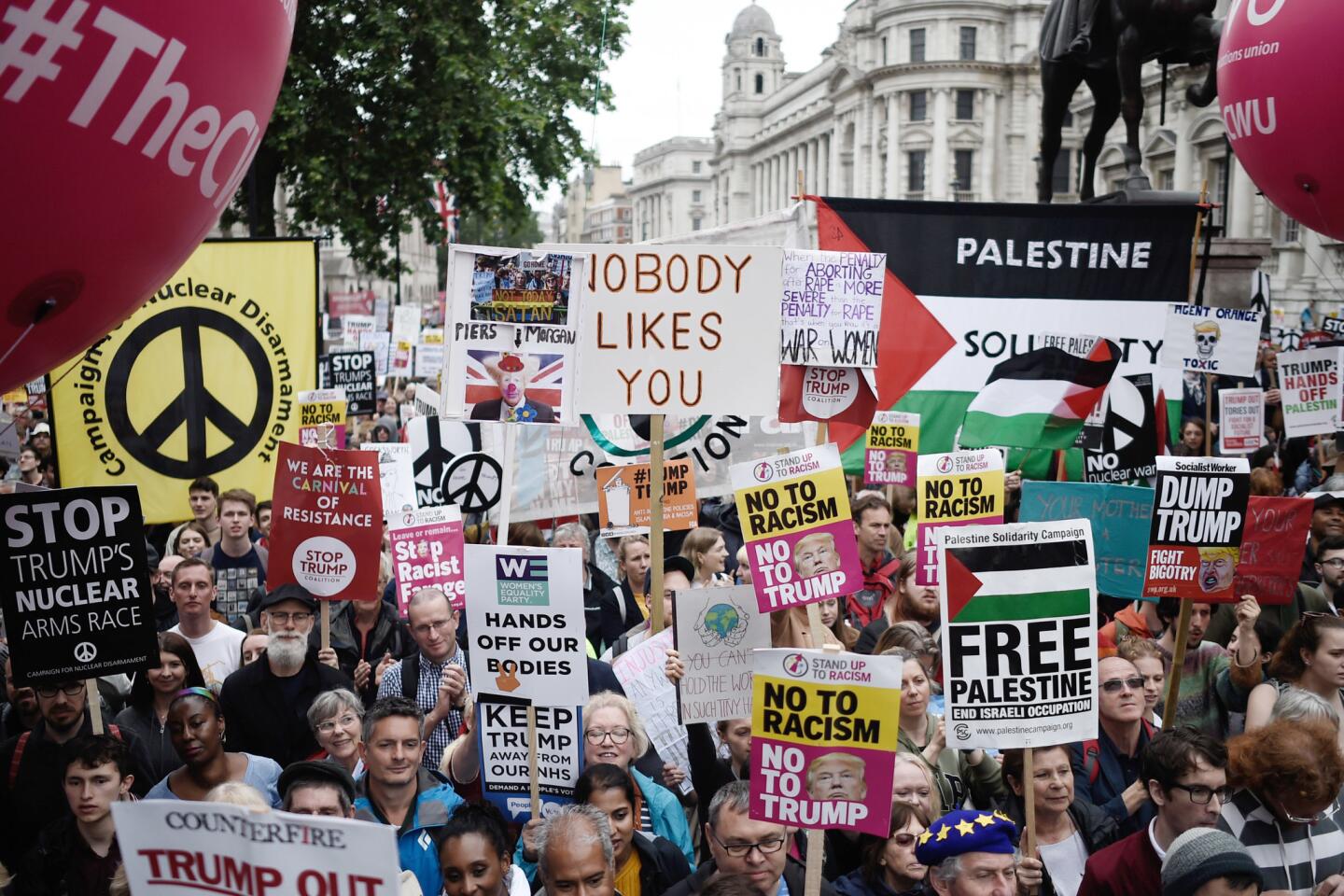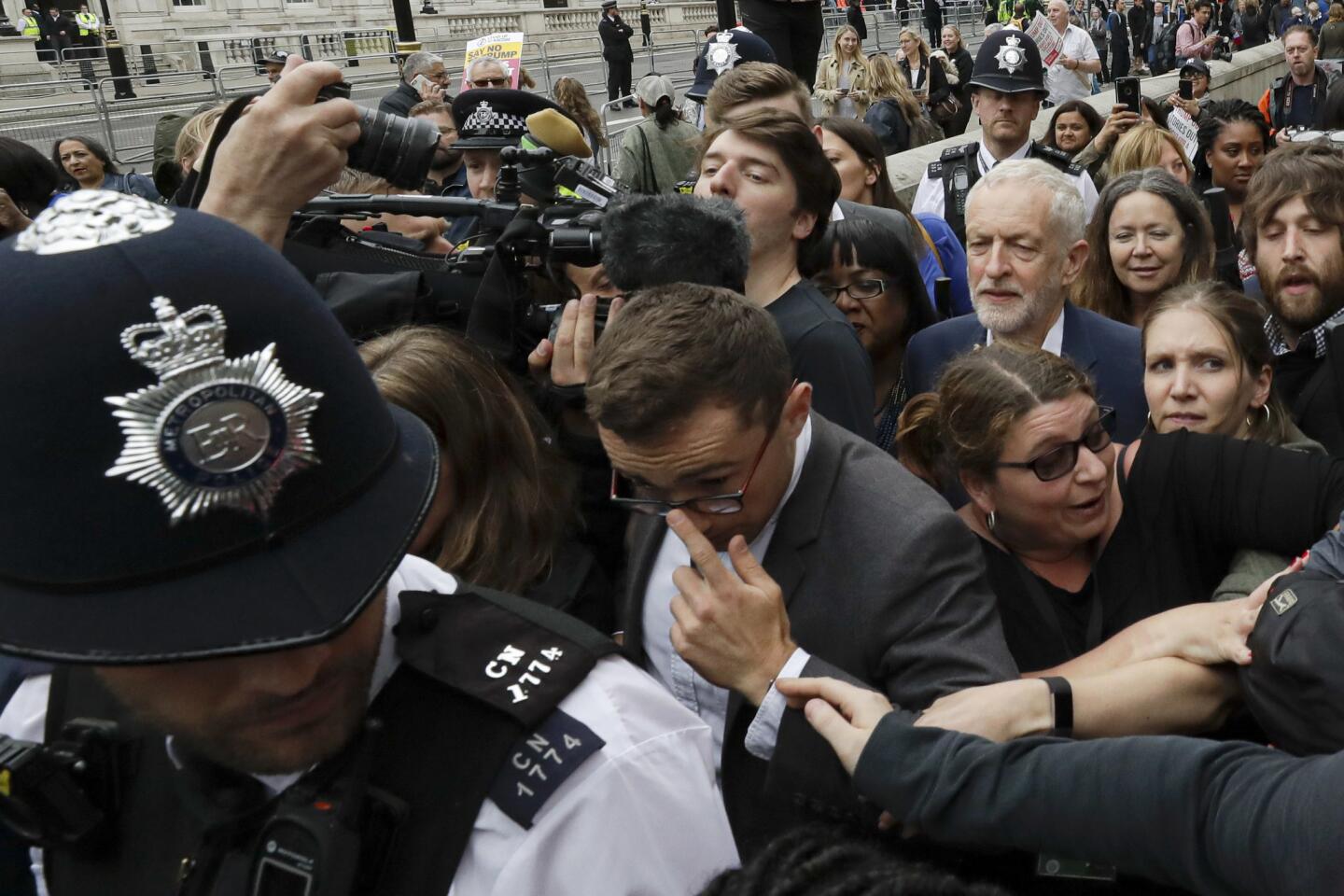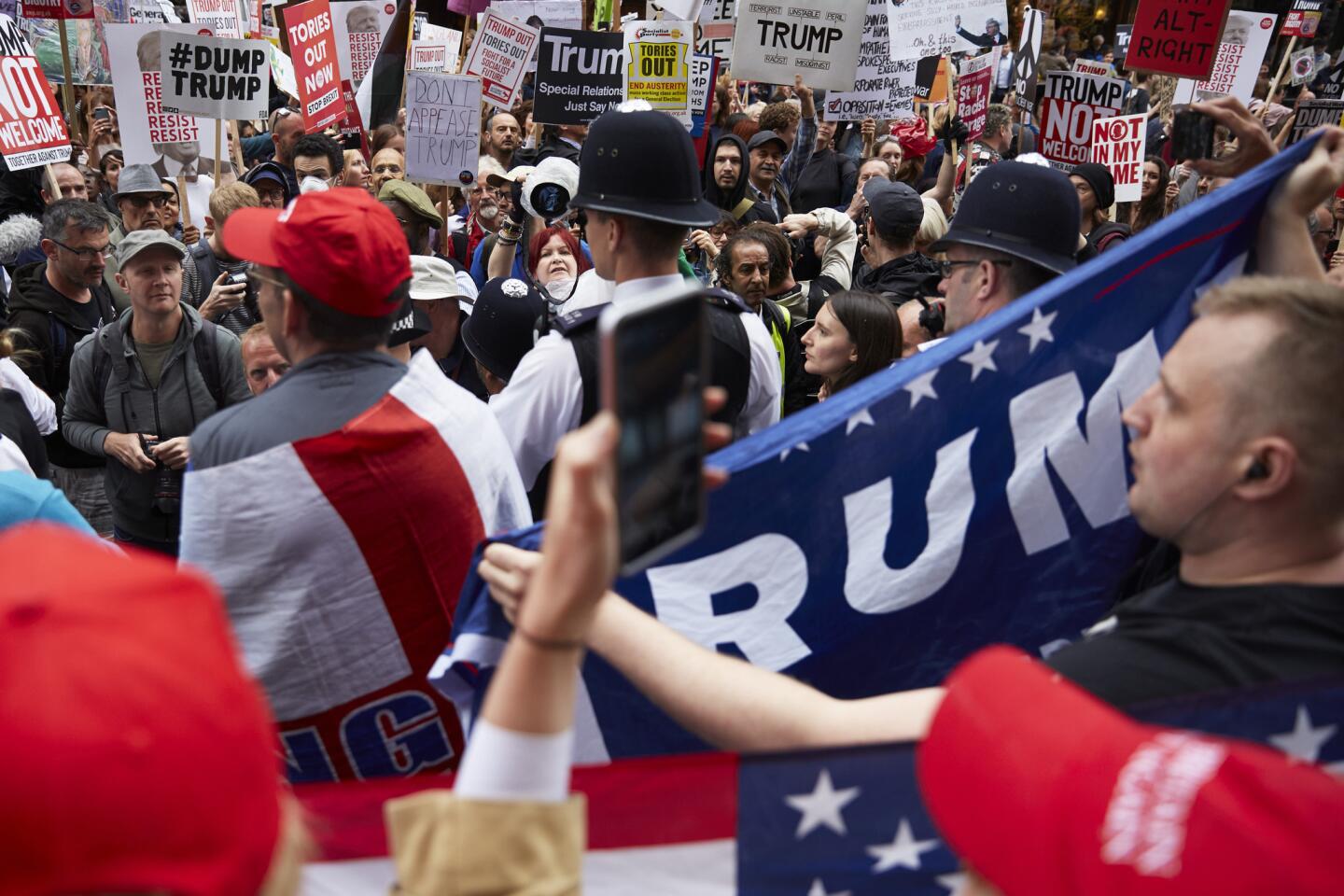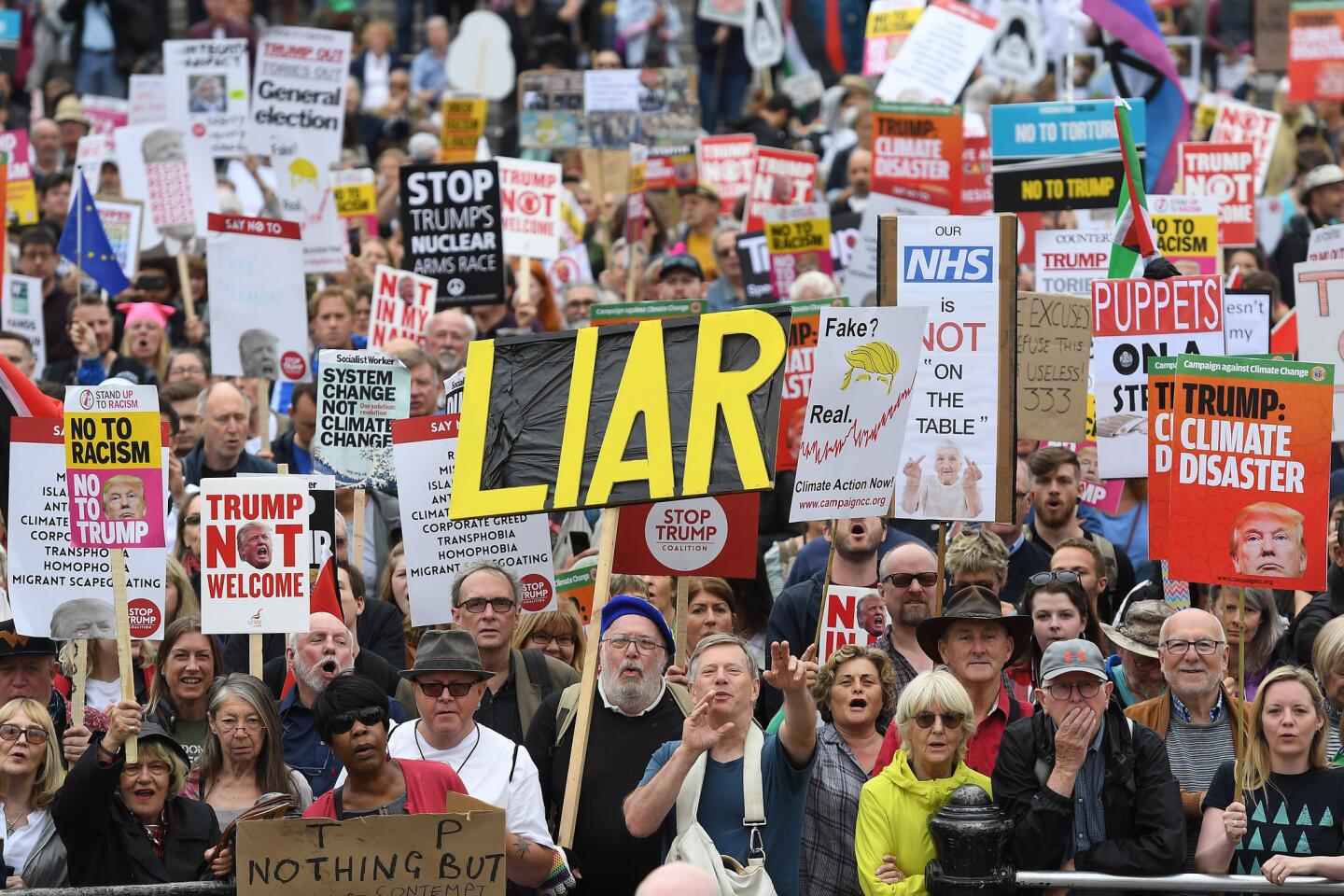Trump praises Brexit in London, but at home, Republicans fret over Mexico tariffs
Reporting from London — President Trump and British Prime Minister Theresa May expressed shared hope that the United Kingdom would eventually leave the European Union and negotiate a bilateral trade deal with the U.S.
“It should happen and it probably will happen,” Trump said, claiming, as he has before, that he correctly predicted the Brexit vote in 2016 but ignoring the seemingly intractable political turmoil it continues to cause.
“This is a great country,” he said. “It wants to have its own borders and run its own affairs.”
As he praised Brexit, Trump also sought to play down a growing fight within his own party over his order to impose tariffs on Mexico if that country’s government doesn’t move to block Central American migrants from crossing its territory to reach the U.S. border.
Trump suggested he might be willing to talk about alternatives.
“We are going to see if we can do something,” he said, “but I think it’s more likely that the tariffs go on.”

Demonstrators in the thousands protested President Trump and his policies in London on June 4, including at Trafalgar Square.
His order for an initial round of 5% tariffs is set to take effect June 10, but the move has generated significant opposition from Republican members of Congress. Mexican officials have been in Washington this week meeting with administration officials and stressing that tariffs would hurt both countries’ economies.
Trump scoffed at the possibility of Republicans in Congress blocking the tariffs, saying that would be “foolish.”
He noted that he has “a 94% approval rating with Republicans,” which drew a chuckle from May.
On Capitol Hill, however, Senate Majority Leader Mitch McConnell (R-Ky.) warned that Trump’s plan has little support among his fellow Republicans.
After Senate Republicans met with White House officials at the Capitol, McConnell said he’s hopeful that talks with Mexico go well enough that tariffs won’t be put in place.
“There is not much support in my conference for tariffs, that’s for sure,” McConnell said. “We’re still hoping that this can be avoided.”
House Majority Leader Steny H. Hoyer (D-Md.) told reporters Tuesday that Republican opposition to the tariffs makes him hopeful Congress could vote to block Trump with a veto-proof majority, something it hasn’t yet been able to do. One route to block the tariffs would be a resolution to disapprove Trump’s declaration of a national emergency at the border. That would also undermine Trump’s effort to use military funds to pay for construction of border barriers.
“I think we may well have the opportunity in a bipartisan way to act on this. Now … we haven’t been too successful in getting to a number that [is] even close to veto-proof,” he said, but “I’m heartened by the fact that at least some Republicans are speaking out, perhaps cautiously.”
Vice President Mike Pence and Secretary of State Michael R. Pompeo plan to host Mexico’s foreign minister, Marcelo Ebrard, at the White House on Wednesday, a White House official said, a day after he met with leaders from both parties on Capitol Hill.
The warm banter between Trump and May was notable, and the news conference was tame compared with others Trump has given since taking office.
But there were several moments that might have drawn attention with a more conventional president.
At one point, Trump appeared confused by a policy-related question — whether a bilateral trade deal with Britain might include changes to Britain’s National Health Service. Trump looked to May for help before saying generically that “everything with the trade deal is on the table.”
Trump also broke with U.S. diplomatic tradition in criticizing Democrats on foreign soil, in this case over immigration. He made several false statements, including an assertion that the protests against him in Britain were “fake news.”
And Trump amplified his continued fight with London’s mayor, Sadiq Khan, whom he called a “stone cold loser” on Monday. Trump gave Khan advice that his own critics might find ironic.
“He should be positive, not negative,” Trump said, adding that Khan should “focus on his job” rather than criticize others. “He could straighten out some of the problems that he has and probably some of the problems that he’s caused,” Trump said.
Conversely, Trump praised May, who is set to resign as leader of the Conservative Party because she has been unable to win Parliament’s support for her Brexit plan.
“I believe the prime minister has brought it to a very good point where something will take place in the very near future. The deal is teed up,” Trump said, telling May: “I think you deserve a lot of credit.”
In truth, May’s resignation resulted from her inability to win support for her plan to leave the 28-nation EU. Considerable uncertainty remains about whether any of the candidates to replace her will be able to deliver the Brexit agreement or whether Britain will simply crash out of the EU without an agreement, a step that officials and business leaders have warned would lead to extensive disruption.
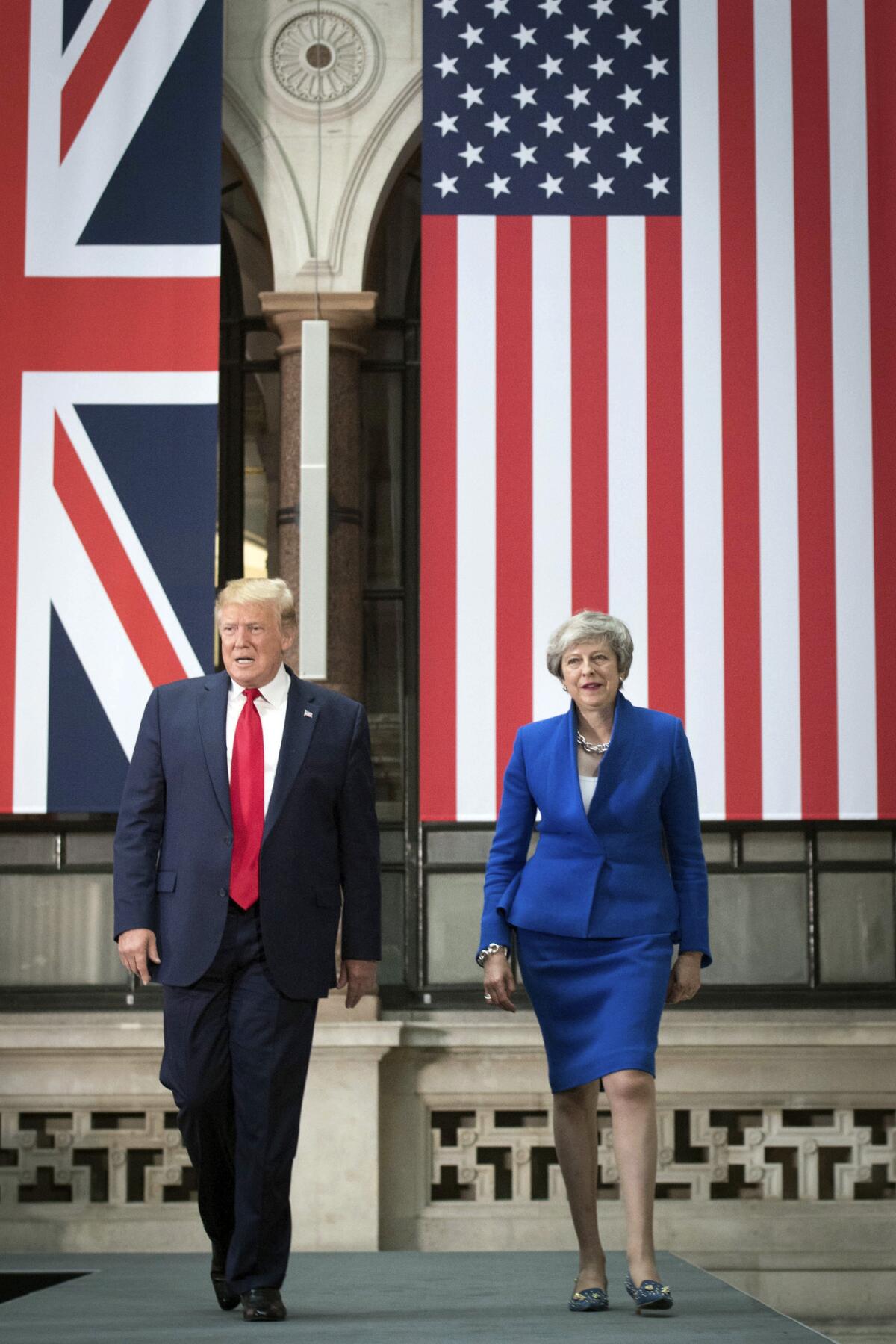
The lighthearted, friendly tone between the two leaders belied the deep uncertainty about the U.K.’s future and its relationships with Europe and the U.S. Britain remains deeply divided over Brexit, with sentiments having hardened on both sides of the debate three years after the referendum in which voters narrowly approved quitting the EU.
In the midst of a two-month-long process to determine May’s successor as Conservative leader and prime minister, Trump tried to refrain from offering a full endorsement to any candidate, but he praised Boris Johnson, the former foreign secretary, as well as current Foreign Secretary Jeremy Hunt.
He had harsher words for the opposition leader, Jeremy Corbyn, saying he refused to meet with the Labor leader because he’s been stung by the politician’s criticism.
“He wanted to meet today or tomorrow, and I would not do that,” Trump said. “I think that from where I come from, he is somewhat of a negative force.”
He added: “I really don’t like critics as much as I like people who get things done.”
The 25-minute news conference, held in an ornate marbled atrium within the Foreign and Commonwealth Office, just blocks from a major gathering of anti-Trump protesters, marked a return to thornier political matters a day after a largely ceremonial official state visit and dinner hosted by Queen Elizabeth II at Buckingham Palace.
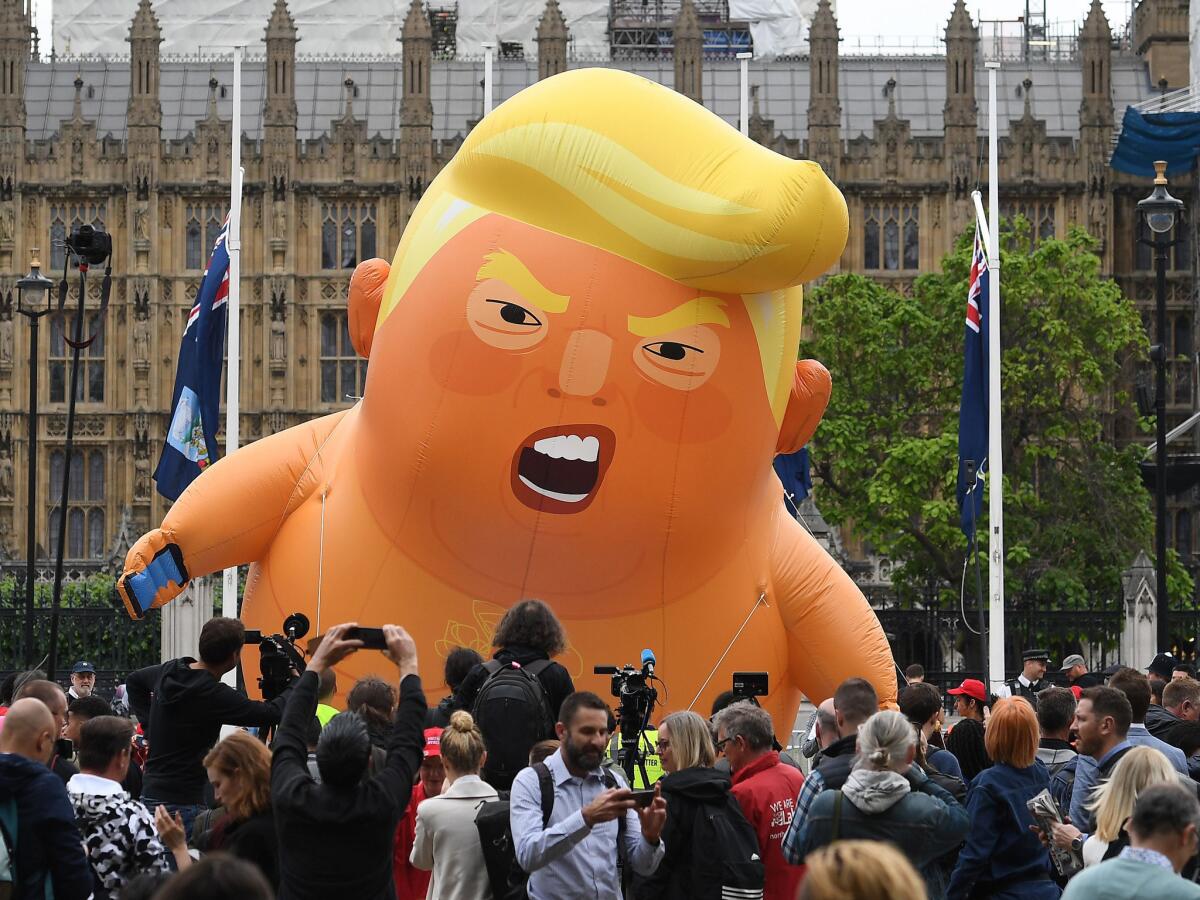
In Parliament Square, just across from 10 Downing St., the prime minister’s residence, a few thousand protesters gathered on a cool morning around a large inflatable balloon of “Baby Trump,” pounding drums, holding signs and marching.
“Sorry Mr. Trump, you’re just not our cup of tea,” read one sign.
“Trump and Brexit are basically the same thing,” said Tim Brassey, 59, who held a sign with an image of Trump kissing Nigel Farage, leader of the newly formed Brexit Party.
“It’s the same phenomenon, the same objectives,” he said. “If Brexit happens, then we are going to be on our knees. Yes, we can do a trade deal with the U.S. but it will be entirely in the U.S.’ favor. We are better off in Europe.”
Earlier in the morning, at a round-table meeting with business leaders, Trump congratulated May on her tenure as prime minister and suggested, albeit lightheartedly, that she postpone her resignation, scheduled for Friday, to hammer out what he predicted would be a “very substantial” new trade agreement between the U.S. and the U.K. that could be completed in a matter of weeks.
“I don’t know exactly what your timing is, but stick around,” Trump said, eliciting chuckles from some seated around a large, wooden conference table. “Let’s do this deal, OK?”
Optimistic rhetoric aside, a bilateral trade deal between the U.S. and Britain is only possible after the U.K. withdraws from the European Union, and even if the British complete their exit from the EU, negotiating a new deal with the U.S. could take years.
Trump reportedly spoke with Johnson by phone Tuesday morning, and he declined the president’s offer to meet in person during his three days in London due to a scheduling conflict, according to a British news report.
Asked about that conversation, Trump said only that he knew and liked Johnson.
He did meet later Tuesday afternoon at Winfield House with Farage. Afterward, Farage tweeted about Trump: “He really believes in Brexit and is loving his trip to London.”
Special correspondent Christina Boyle in London and Times staff writers Noah Bierman and Sarah D. Wire in Washington contributed to this report.
More stories from Eli Stokols »
More to Read
Get the L.A. Times Politics newsletter
Deeply reported insights into legislation, politics and policy from Sacramento, Washington and beyond. In your inbox three times per week.
You may occasionally receive promotional content from the Los Angeles Times.
